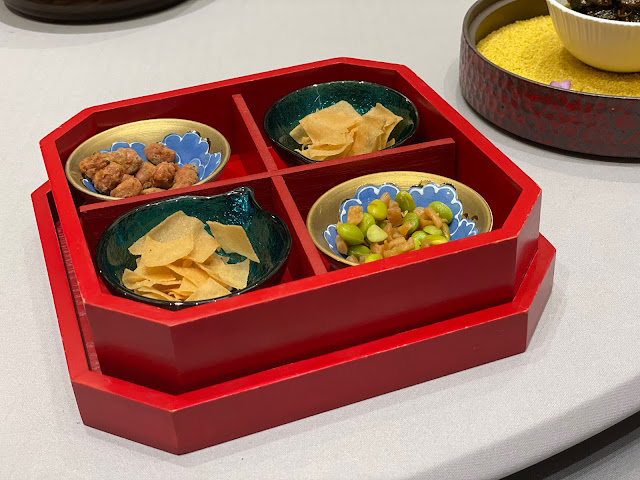We left the ordering duty to those who have been to the place before and we ended up with a dozen or so dishes. Jiang-zhe Cuisine 江浙菜, geographically rooted in the Eastern part of China (covering Jiangsu and Zhejiang provinces plus Shanghai), is one culinary genre known to most but mastered by only few because the cooking styles and ingredients may vary greatly from region to region. For example, Yong Fu, which specializes in cooking from Ningbo, a prosperous coastal town in Zhejiang, put emphasis on fresh produce grown from the river basin and seafood from the Yong River which flew through the region and the adjacent coast.
Our first dish of "18-Cut Raw Crabs" 招牌十八斬 arrived while we munched on the snacks of pickled vegetables and crispy nuts. Mud crabs from the river delta were deep-froze and then marinated raw with soy sauce and huadiao wine. It was then carefully carved into 18 pieces (hence the name) and served raw over a bed of the marinate. Some might hesitate to taste the raw crab, but for those who dare, they were awarded with the freshest, cleanest umami flavor from the delicate crab meat well infused with the rich marinate and the creamy crab roes. Admittedly I do prefer crabs be eaten cooked but this signature dish is definitely worth a try every now and then for the unique flavor.We went on with a few vegetable dishes. The celtuce was shaped like a knot, minimally-seasoned, flash-blanched and served chilled so we got the purest flavor from the fresh ingredient with a nice crunchy texture. The braised bamboo shoot was a tad milder than the Shanghainese style one with more balanced flavor. Chiang’s Taro Potage 蔣公芋艿羹, named after General Chiang Kai-shek who’s a Ningbo native, got a good homey flavor with taro mashed and mixed with lard for the perfect thick texture and rich aroma, especially good during the colder seasons. Ningbo style braised eel (寧式鱔糊) was unlike the traditional braised eel dish (響油鱔糊), cooked with a much lighter sauce base, so one could actually taste the fresh river eel with just a hint of garlic and chives along with julienned sponge gourd. Another memorable dish was the sea anemones glass noodles (沙蒜豆麵), with the glass noodles made from sweet potato flour served in a soup slow-cooked with the umami-rich sea anemones.The spicy softshell turtle was considered a delicacy (and perhaps the most expensive dish we ordered this time), but I just wasn’t that much of a fan. The dish tasted fine with just the right kick of chili flavor, similar to what one would find in a Sichuan dish, but I thought the softshell turtle wasn’t meaty enough. For spicy dish, I very much preferred the mapo tofu served with minced meat and seafood, arrived at our table bubbling hot and went perfectly well with a bowl of rice with the hint of numb spiciness. We then finished with a few more savory dishes, including the classic noodles with scallion and oil and the dessert of Ningbo sweet dumplings, perhaps the most well-known Ningbo dish.
Many drew comparison between the food at Yong Fu and that from Xin Rong Ji, a restaurant just down in the next block also specializes in Jiang-zhe Cuisine dishes (and also got a Michelin star), but I guess they were subtly different, and I do like Yong Fu for many of their homestyle dishes, true to the traditional cooking but given a fine-dining spin to make them more presentable. It was a lovely meal and time spent with friends (before the current dine-in ban) and I was happy to check this one off the list of places that I haven't been.
More photos: https://www.flickr.com/photos/g4gary/albums/72177720296305038
Where? Yong Fu, Shop 2 20-24 Lockhart Road, Wanchai, Hong Kong
Menu Highlights? Ningbo-style Braised Eels








No comments :
Post a Comment